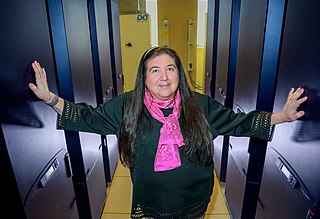
Frederick Phillips Brooks Jr. was an American computer architect, software engineer, and computer scientist, best known for managing the development of IBM's System/360 family of computers and the OS/360 software support package, then later writing candidly about those experiences in his seminal book The Mythical Man-Month.

Ivan Edward Sutherland is an American computer scientist and Internet pioneer, widely regarded as a pioneer of computer graphics. His early work in computer graphics as well as his teaching with David C. Evans in that subject at the University of Utah in the 1970s was pioneering in the field. Sutherland, Evans, and their students from that era developed several foundations of modern computer graphics. He received the Turing Award from the Association for Computing Machinery in 1988 for the invention of the Sketchpad, an early predecessor to the sort of graphical user interface that has become ubiquitous in personal computers. He is a member of the National Academy of Engineering, as well as the National Academy of Sciences among many other major awards. In 2012, he was awarded the Kyoto Prize in Advanced Technology for "pioneering achievements in the development of computer graphics and interactive interfaces".

Jack Joseph Dongarra is an American computer scientist and mathematician. He is the American University Distinguished Professor of Computer Science in the Electrical Engineering and Computer Science Department at the University of Tennessee. He holds the position of a Distinguished Research Staff member in the Computer Science and Mathematics Division at Oak Ridge National Laboratory, Turing Fellowship in the School of Mathematics at the University of Manchester, and is an adjunct professor and teacher in the Computer Science Department at Rice University. He served as a faculty fellow at the Texas A&M University Institute for Advanced Study (2014–2018). Dongarra is the founding director of the Innovative Computing Laboratory at the University of Tennessee. He was the recipient of the Turing Award in 2021.

Richard Farris Rashid is the founder of Microsoft Research, which he created in 1991. Between 1991 and 2013, as its chief research officer and director, he oversaw the worldwide operations for Microsoft Research which grew to encompass more than 850 researchers and a dozen labs around the world.
Nancy Ann Lynch is a computer scientist affiliated with the Massachusetts Institute of Technology. She is the NEC Professor of Software Science and Engineering in the EECS department and heads the "Theory of Distributed Systems" research group at MIT's Computer Science and Artificial Intelligence Laboratory.

Marc Levoy is a computer graphics researcher and Professor Emeritus of Computer Science and Electrical Engineering at Stanford University, a vice president and Fellow at Adobe Inc., and a Distinguished Engineer at Google. He is noted for pioneering work in volume rendering, light fields, and computational photography.

Patrick M. Hanrahan is an American computer graphics researcher, the Canon USA Professor of Computer Science and Electrical Engineering in the Computer Graphics Laboratory at Stanford University. His research focuses on rendering algorithms, graphics processing units, as well as scientific illustration and visualization. He has received numerous awards, including the 2019 Turing Award.
Edward Joseph McCluskey was a professor at Stanford University. He was a pioneer in the field of Electrical Engineering.
Heung-Yeung "Harry" Shum is a Chinese computer scientist. He was a doctoral student of Raj Reddy. He was the Executive Vice President of Artificial Intelligence & Research at Microsoft. He is known for his research on computer vision and computer graphics, and for the development of the search engine Bing.
Dinesh Manocha is an Indian-American computer scientist and the Paul Chrisman Iribe Professor of Computer Science at University of Maryland College Park, formerly at University of North Carolina at Chapel Hill. His research interests are in scientific computation, robotics, self-driving cars, affective computing, virtual and augmented reality and 3D computer graphics.
Ming C. Lin is an American computer scientist and a former chair of the Department of Computer Science at the University of Maryland, College Park, where she also holds an endowed faculty position as the Elizabeth Stevinson Iribe Chair of Computer Science. Prior to moving to Maryland in 2018, Lin was the John R. & Louise S. Parker Distinguished Professor of Computer Science at the University of North Carolina at Chapel Hill.

Jitendra Malik is an Indian-American academic who is the Arthur J. Chick Professor of Electrical Engineering and Computer Sciences at the University of California, Berkeley. He is known for his research in computer vision.

The University of Illinois Department of Computer Science is the academic department encompassing the discipline of computer science at the University of Illinois Urbana-Champaign. According to U.S. News & World Report, both its undergraduate and graduate programs rank in the top five among American universities, and according to Computer Science Open Rankings, the department ranks equally high in placing Ph.D. students in tenure-track positions at top universities and winning best paper awards. The department also ranks in the top two among all universities for faculty submissions to reputable journals and academic conferences, as determined by CSRankings.org. From before its official founding in 1964 to today, the department's faculty members and alumni have contributed to projects including the ORDVAC, PLATO, Mosaic, JavaScript and LLVM, and have founded companies including Siebel Systems, Netscape, Mozilla, PayPal, Yelp, YouTube, and Malwarebytes.

Carolina Cruz-Neira is a Spanish-Venezuelan-American computer engineer, researcher, designer, educator, and a pioneer of virtual reality (VR). She is known for inventing the cave automatic virtual environment (CAVE). She previously worked at Iowa State University (ISU), University of Louisiana at Lafayette, University of Arkansas at Little Rock, and she is currently an Agere Chair Professor at University of Central Florida (UCF).
John Turner Whitted is an electrical engineer and computer scientist who introduced recursive ray tracing to the computer graphics community with his 1979 paper "An improved illumination model for shaded display". His algorithm proved to be a practical method of simulating global illumination, inspired many variations, and is in wide use today. Simple recursive implementations of ray tracing are still occasionally referred to as Whitted-style ray tracing.

Demetri Terzopoulos is a Greek-Canadian-American computer scientist and entrepreneur. He is currently a Distinguished Professor and Chancellor's Professor of Computer Science in the Henry Samueli School of Engineering and Applied Science at the University of California, Los Angeles, where he directs the UCLA Computer Graphics & Vision Laboratory.
Helmut Veith was an Austrian computer scientist who worked on the areas of computer-aided verification, software engineering, computer security, and logic in computer science. He was a Professor of Informatics at the Vienna University of Technology, Austria.

Amitabh Varshney is an Indian-born American computer scientist. He is an IEEE fellow, and serves as Dean of the University of Maryland College of Computer, Mathematical, and Natural Sciences. Before being named Dean, Varshney was the director of the University of Maryland Institute for Advanced Computer Studies (UMIACS) from 2010 to 2018.

Eugene Wong is a Chinese-American computer scientist and mathematician. Wong's career has spanned academia, university administration, government and the private sector. Together with Michael Stonebraker and a group of scientists at IBM, Wong is credited with pioneering database research in the 1970s from which software developed by IBM, Microsoft, and Oracle descends. Wong retired in 1994, since then holding the title of Professor Emeritus of Electrical Engineering and Computer Sciences at University of California, Berkeley.
Victoria Lynn Interrante is an American computer scientist specializing in computer graphics, scientific computing, and virtual environments. She is a professor of computer science and engineering at the University of Minnesota, a founder of the annual ACM Symposium on Applied Perception in Graphics and Visualization, and co-editor-in-chief of the journal ACM Transactions on Applied Perception.













